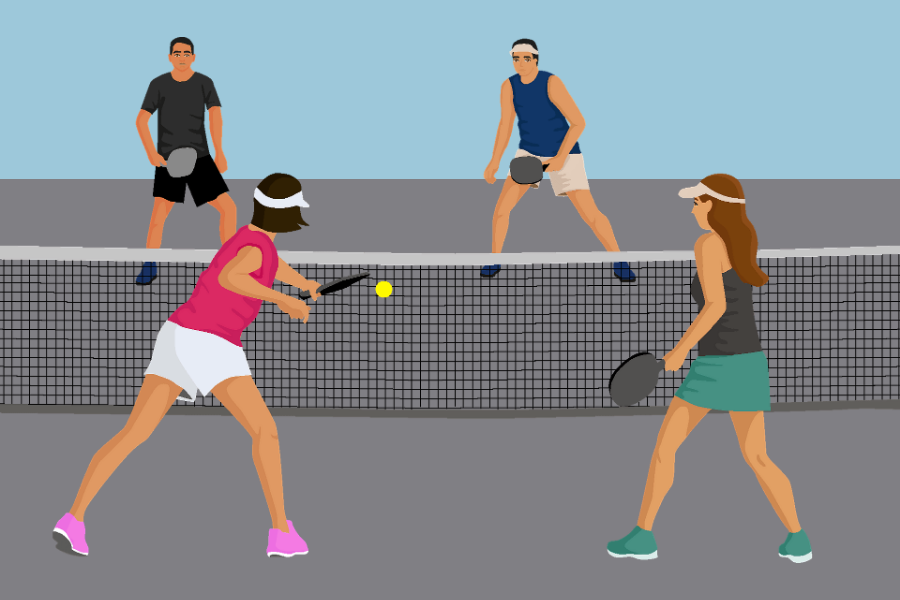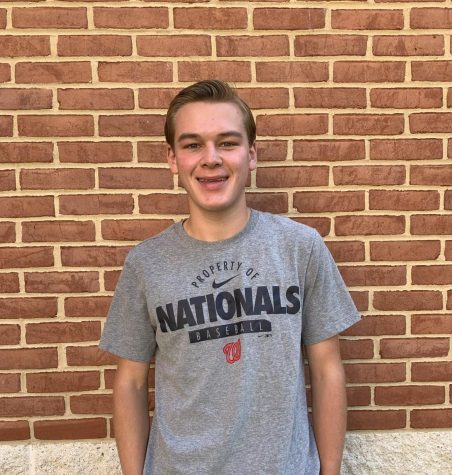Pickleball practice makes pickleball perfect
I played pickleball frequently with my family while I was on vacation.
January 19, 2021
In the fall of seventh grade, I distinctly remember the day my P.E. teacher brought my class to the tennis courts and toted out large, strange looking paddles and wiffle balls. For the next hour and a half I ran around the asphalt, learning the sport of pickleball and having the time of my life. This experience was my first introduction to pickleball, an unconventional sport but one of my favorites. Now, three years later, I coach middle and high school pickleball players every week.
To the uninitiated, pickleball looks similar to tennis with a wiffle ball. Pickleball games tend to move at a faster clip than the average tennis match because of their lighter, less elastic balls which players swing at with wooden or plastic paddles. It certainly isn’t the most athletically challenging or intense activity, but it does require good hand-eye coordination and ball placement skills.
When I first played pickleball at Pyle, I loved it because it deviated from the more traditional sports I had been playing my whole life. I’d been a part of the same baseball league since I was five, and I hadn’t endeavored into any new sports since. After years of traditional athletics, pickleball was a fresh way to stay on the courts I loved.
Still, I only played during P.E., classes, and after I graduated from Pyle, I stopped playing it altogether. I wasn’t sure if I wanted to continue pursuing something so far outside of my comfort zone.
But after my baseball season was canceled last summer, I picked up pickleball again to occupy my time. The one-on-one, outdoor format of pickleball games made it easier to follow COVID-19 safety guidelines while playing, unlike many other sports that involve teams and contact. I played frequently during my summer vacation. I’d wake up early, bike down to tennis courts and start a game with my family.
When I returned from vacation, I was enthusiastic to continue playing. I didn’t want pickleball to be relegated to a summer-only sport, although sticking to this plan proved initially challenging. Whitman doesn’t have its own pickleball team, which left me looking for a local organization on my own.
Eventually I found out that the Whitman squash coach, Connie Barnes, was also holding pickleball clinics several times a week outside her house. I eagerly attended, and my skills improved steadily over the next several weeks. In that span, I went from a casual pickleball enthusiast to a determined athlete.
Eventually, my coach offered me the chance to run my own weekly clinic. The opportunity excited me. Coaching seemed like a clear way to encourage others to get involved, while improving my own leadership skills, and I enthusiastically accepted the offer.
I am now well into my third month of coaching weekly clinics, and the experience has been a rewarding one. Almost every kid who has come to the clinics picked up pickleball during the pandemic, just like me. Though many of the kids were experienced athletes in tennis or squash or badminton, few had ever considered pickleball until quarantine.
Playing and teaching pickleball safely during a global pandemic is a part of my weekly routine I have come to cherish. Each week, I get to participate in a community of new players and reach out of my comfort zone. These communal experiences make coaching worth every minute.
The effects of the pandemic will certainly impact our immediate and distant futures, but its role in shaping my interests is a silver lining. I found a new sport I deeply enjoy, and can now share that passion by teaching novice players. It’s no easy task to find a supportive community in such a frenzied year, but I’m glad I’ve been able to become involved in one.










